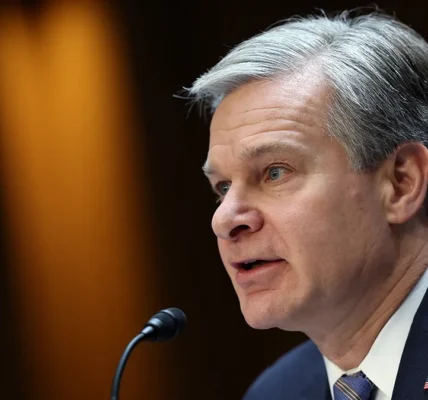Dissenting Voices Emerge as Ohio Grapples with LGBTQ+ Rights and Legislation
In an unexpected departure from the prevailing sentiment within his political party, Republican Governor Mike DeWine of Ohio has rejected House Bill 68, a contentious piece of legislation aiming to restrict gender-affirming care for minors and curtail transgender athletes’ participation in girls’ and women’s sports. The governor’s surprising move, unveiled in a press conference on Friday, has triggered a flurry of reactions, amplifying the ongoing discourse around LGBTQ+ rights in the state.
House Bill 68 has been the focal point of impassioned debates, garnering support for its purported defense of the integrity of girls’ and women’s sports and facing criticism for its perceived infringement on the rights of transgender individuals, particularly minors in need of gender-affirming care.
Read More News:
- Mental Health Matters: Nurturing a Holistic Approach to Well-being
- Same Sex Marriage in US
- Vatican Embraces Progress: Pope Francis Approves Blessings for Same-Sex Couples in Historic Policy Shift
The diverse responses to Governor DeWine’s veto underscore the profound divisions within Ohio’s political landscape. One vocal critic of the decision is the Alliance Defending Freedom, a nonprofit legal organization advocating for religious freedom, free speech, and parental rights. Matt Sharp, Senior Counsel with the Alliance Defending Freedom, expressed disappointment, characterizing the governor’s move as a “betrayal to children, families, and women throughout Ohio.” Sharp contends that alternative solutions exist to address gender dysphoria in children without resorting to legislation that, in his view, could lead to “risky medicalization.”
The veto has also attracted scrutiny from Cincinnati Children’s, a prominent medical institution in the state. Dr. Steve Davis, the CEO of Cincinnati Children’s, had previously conveyed concerns about the potential ramifications of House Bill 68. In a statement following Governor DeWine’s veto, a spokesperson for Cincinnati Children’s expressed gratitude for the governor’s “considered approach” in researching the issue of gender-affirming care. The statement underscored the institution’s commitment to collaborating with the governor and relevant state agencies to ensure access to necessary care for Ohio’s youth.
Beyond political circles, apprehensions are voiced about the potential impact of House Bill 68 on the mental health of minors. Dr. Davis, in earlier communications with legislators, cautioned that the bill, in its current form, could impede doctors and parents from collectively determining the optimal treatment for children, potentially leading to untreated mental health issues and avoidable deaths.
While Governor DeWine’s veto reflects his stance on gender-affirming care, the political narrative is far from concluded. GOP lawmakers, endowed with the authority to override the governor’s veto, confront decisions on whether and when to pursue such a course of action. The aftermath of this decision underscores the intricate interplay of politics, healthcare, and LGBTQ+ rights in Ohio, leaving the state wrestling with the complexities of navigating a deeply divided landscape.
As Ohio grapples with these ideological clashes, it becomes crucial to dissect the nuances of the opposing viewpoints. On one side, proponents of House Bill 68 argue for the safeguarding of girls’ and women’s sports, contending that unrestricted participation by transgender athletes could compromise the fairness of competition. They emphasize the need to establish a level playing field, preserving the integrity of sports categories based on biological sex.
Conversely, critics, including Governor DeWine, argue that such legislation could disproportionately impact the rights of transgender individuals, especially minors seeking gender-affirming care. The debate extends beyond sports, delving into fundamental questions of individual rights, healthcare autonomy, and the broader societal perception of LGBTQ+ individuals.
The Alliance Defending Freedom, while disappointed with the veto, echoes these sentiments, emphasizing the importance of finding alternative solutions that address the concerns of both sides. Matt Sharp contends that prioritizing psychological and counseling interventions over legislative measures could lead to better outcomes for children experiencing gender dysphoria.
In the medical sphere, Cincinnati Children’s stands as a key player, expressing concerns about potential impediments to collaborative decision-making between doctors and parents under House Bill 68. The institution’s focus on a collaborative approach to gender-affirming care reflects a commitment to comprehensive and personalized healthcare for transgender youth.
As the political drama unfolds, Ohio finds itself at a crossroads, navigating the complex intersection of legislative decisions, healthcare considerations, and the rights of the LGBTQ+ community. The veto by Governor DeWine serves as a catalyst for continued dialogue, prompting stakeholders to reevaluate the balance between safeguarding sports integrity and respecting the rights and well-being of transgender individuals.
In conclusion, Ohio’s political landscape is marked by deep-seated divisions, with House Bill 68 at the center of a contentious debate. Governor DeWine’s veto has ignited conversations about the delicate balance between sports fairness and the rights of transgender individuals. The aftermath of this decision will undoubtedly shape the trajectory of LGBTQ+ rights and healthcare legislation in Ohio, reinforcing the need for ongoing dialogue, understanding, and a commitment to finding common ground amidst ideological differences.




